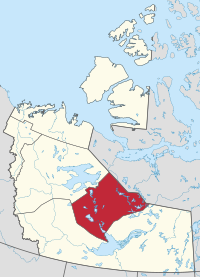Tłı̨chǫ Government facts for kids
Quick facts for kids
Tłı̨chǫ Government
Tłı̨chǫ Ndek'àowo (Tłı̨chǫ)
|
||
|---|---|---|
|
Indigenous government
|
||
|
||
| Motto(s):
Strong like two people
|
||

Wekʼèezhìı within the Northwest Territories
|
||
| Country | Canada | |
| Territory | Northwest Territories | |
| Region | North Slave | |
| Territorial riding | Monfwi | |
| Established | August 4, 2005 | |
| Population
(2016)
|
||
| • Total | 2,751 | |
| Website | Official website: https://www.tlicho.ca/ | |
The Tłı̨chǫ Government is a special government for the Tłı̨chǫ Nation. They are a group of Dene people who live in the Northwest Territories, Canada. This government was created in 2005. It happened when the Tłı̨chǫ Nation made an agreement with the Government of Canada. This agreement is called the Tłı̨chǫ Agreement.
Contents
What is the Tłı̨chǫ Government?
The Tłı̨chǫ Government is a First Nations organization. It represents the Tłı̨chǫ Nation. They are an Indigenous group of people. The government helps manage their lands and resources. It also helps them govern themselves.
The Tłı̨chǫ Agreement
The Tłı̨chǫ Agreement is a very important document. It was signed in 2005. This agreement gave the Tłı̨chǫ Government special rights. They gained ownership of a large area of land. This land is about 39,000 square kilometers. It's located between Great Slave Lake and Great Bear Lake.
The Tłı̨chǫ Government owns both the surface of the land and the minerals underground. They can also decide who is a Tłı̨chǫ citizen. They have power over their lands and resources. The agreement also set up special boards. These include the Wekʼèezhìı Land and Water Board. There is also the Wekʼèezhìı Renewable Resources Board. The Tłı̨chǫ Government also gets a share of money from minerals found in the Mackenzie Valley.
The word Tlı̨chǫ means "Dogrib."
Traditional Lands and Management Areas
The traditional area of the Tłı̨chǫ Nation is very old. Chief Monfwi described it in 1921. This was during the signing of Treaty 11. He called it Monfwı̀ Gogha Dè Nı̨htł'è.
Today, there is a management area called Wekʼèezhìi. This area is defined by the Tłı̨chǫ Agreement. It is larger than the land directly owned by the Tłı̨chǫ. Wekʼèezhìi shares borders with other areas. These include the Sahtu Settlement Area and Nunavut.
This area includes the four main Tłı̨chǫ communities. These are Gamèti, Wekweètì, Whatì, and Behchokǫ̀. Important diamond mines are also in this area. These include the Ekati and Diavik Diamond Mines.
Managing Wildlife and Resources
The Tłı̨chǫ Government plays a big role in managing wildlife. They work with other groups. This helps protect animals and their homes.
Wekʼèezhìi Renewable Resource Board
The Tłı̨chǫ Government helps run the Wekʼèezhìi Renewable Resource Board (WRRB). This board helps manage wildlife. It also looks after wildlife habitats. These habitats include forests, plants, and protected areas. The WRRB works in the Wekʼèezhìi area.
The Tłı̨chǫ Government chooses half of the people on this board. The other half are chosen by the Government of Canada and the Government of Northwest Territory. This board is a public government institution.
Protecting Caribou
The Tłı̨chǫ Government works to protect animals like the boreal caribou. These caribou are a type of woodland caribou. In 2013, boreal caribou were listed as a threatened species. This means they need special protection. The Tłı̨chǫ Government helps make plans to keep them safe.
Tłı̨chǫ Communities
The Tłı̨chǫ Government represents four main communities. These are:
 | Delilah Pierce |
 | Gordon Parks |
 | Augusta Savage |
 | Charles Ethan Porter |


